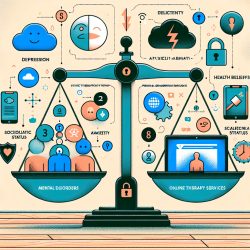The utilization of healthcare services for mental health reasons is a complex process influenced by various factors. According to a study titled "Predictors of Healthcare Service Utilization for Mental Health Reasons," understanding these factors can significantly enhance the effectiveness of mental health practitioners. This blog post delves into the study's findings and offers practical advice for practitioners seeking to improve their skills and patient outcomes.
The Andersen Behavioral Model
The study employs the Andersen behavioral model, which categorizes factors affecting healthcare service utilization into three main components: predisposing, enabling, and needs factors. Understanding these components can help practitioners identify why certain individuals are more likely to seek mental health services.
- Predisposing Factors: These include demographic characteristics such as age, gender, and education level. The study found that females are more likely to utilize mental health services than males, possibly due to social norms and roles that encourage women to seek help.
- Enabling Factors: These involve resources that facilitate or hinder access to healthcare services, such as income and social support. The study highlights that individuals with higher household income and better social support are more likely to seek mental health services.
- Needs Factors: These are related to the severity and type of mental health issues. Individuals experiencing major depressive episodes, panic disorders, or emotional problems are more likely to utilize mental health services.
Practical Applications for Practitioners
For practitioners, understanding these predictors can inform strategies to encourage service utilization among those who need it most. Here are some practical applications:
- Enhance Awareness: Educate patients about the importance of seeking help early, especially males who may delay seeking treatment until their condition worsens.
- Leverage Social Support: Encourage patients to build strong support networks, as social support is a critical enabling factor for accessing mental health services.
- Focus on Needs Factors: Prioritize patients with severe symptoms such as depression or anxiety disorders, as they are more likely to benefit from immediate intervention.
- Cultural Sensitivity: Be mindful of cultural differences that may influence perceptions of mental health and willingness to seek treatment.
The Role of Online Therapy Services
In today's digital age, online therapy services like those provided by TinyEYE offer an innovative solution to overcome barriers related to geographic location and accessibility. By offering flexible and convenient access to mental health professionals, online therapy can address enabling factors such as transportation issues and time constraints.
Encouraging Further Research
The study also highlights the importance of further research into environmental variables and self-perception of neighborhoods as predictors of healthcare service utilization. Practitioners are encouraged to stay informed about ongoing research in this area to continually refine their approaches and improve patient outcomes.
To read the original research paper, please follow this link: Predictors of Healthcare Service Utilization for Mental Health Reasons.










